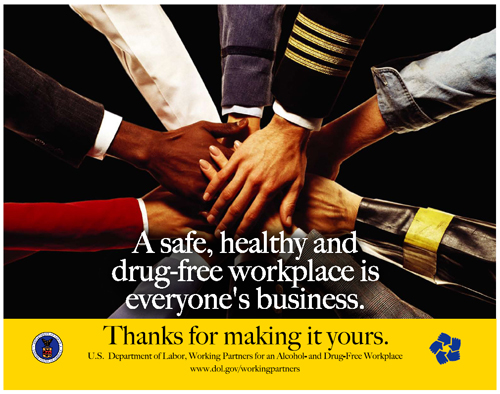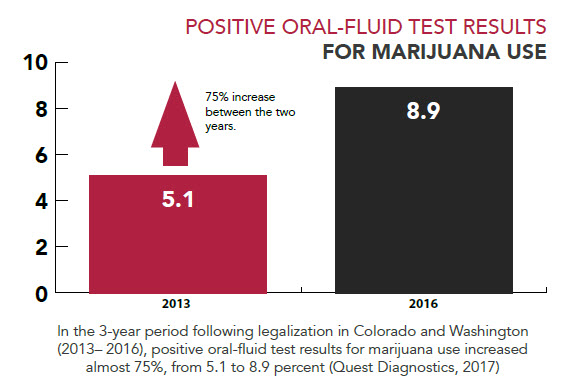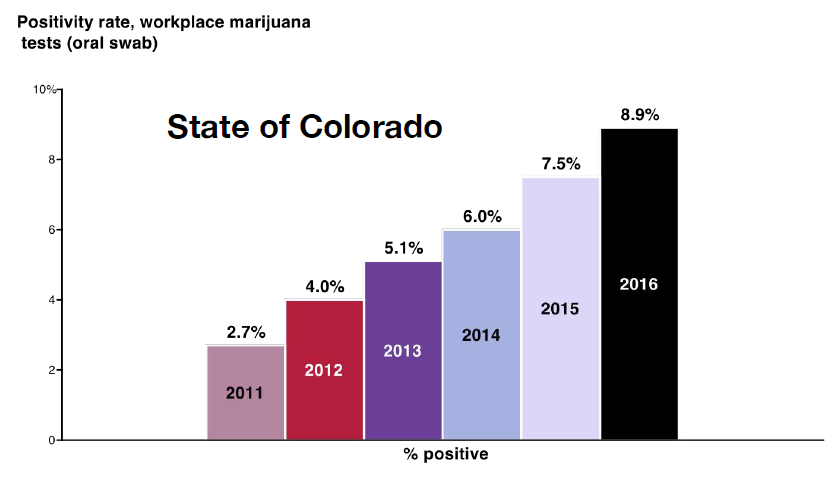 Would anyone want their doctor getting high just before performing surgery? Or a co-worker who drives a forklift and could impale not only packages but them? What about carpenters, roofers, tree trimmers and truck drivers who have been using marijuana? Would you be happy to know that your pilot had smoked a joint or two the night before?
Would anyone want their doctor getting high just before performing surgery? Or a co-worker who drives a forklift and could impale not only packages but them? What about carpenters, roofers, tree trimmers and truck drivers who have been using marijuana? Would you be happy to know that your pilot had smoked a joint or two the night before?
In the US, marijuana legalisation has had serious ramifications for businesses. Increased marijuana availability and use has increased the number of employees testing positive for marijuana in the workforce.
According to a study reported by the National Institute on Drug Abuse, employees who tested positive for marijuana had 55% more industrial accidents, 85% more injuries and 75% greater absenteeism compared to those who tested negative.
Marijuana is the most commonly detected substance and has the highest drug positivity rate among all other tested substances across the majority of industry sectors in the U.S. (Quest Diagnostics, 2017). Among the top-ranking industries for the highest rates of positive marijuana testing, transportation and warehousing was number one with 33.3%. Meanwhile the construction industry had an average of 26.7% positive marijuana testing (Quest Diagnostics, 2018). Source: SAM
In the three-year period following legalisation in Colorado and Washington, positive oral-fluid test results for marijuana use increased almost 75%, from 5.1% to 8.9%. Marijuana urine test results in Washington and Colorado are now double the national average.
One in four marijuana users who are employed admit to getting high at work within the past year, according to a new survey of cannabis consumers in Washington, Oregon and Colorado, three states where recreational weed is legal… The survey shows that after legalisation, many cannabis consumers increased their usage.
Workforce marijuana-positivity rates in all “legal” states but one (Alaska) are above the national average. For example, 2018 positivity rates in Maine (5.0%), Oregon (4.3%), Nevada (4.0%), Massachusetts (3.3%), Colorado (3.0%), California (2.5%), and Washington (2.4%) are higher than the national average (2.3%) (Quest Diagnostics, 2019). Most states that have legalised marijuana show an increasing trend in positivity rates. Source: SAM

Source: SAM http://newsroom.questdiagnostics.com/2017-05-16-Increases-in-Illicit-Drugs-Including-Cocaine-Drive-Workforce-Drug-Positivity-to-Highest-Rate-in-12-Years-Quest-Diagnostics-Analysis-Finds
This growing usage of marijuana has made it difficult to find employees who can pass a pre-employment drug test. The issue is further complicated by pro-marijuana advocates who are pushing to eliminate workplace drug testing policies – essentially stating that regardless of the outcome, employees should be permitted to use marijuana without the risk of professional consequences.
This argument has been used in New Zealand by pro-marijuana lobbyists. In May 2018, the Drug Foundation said, “Drug testing is not going to create a safer working environment and can create an atmosphere of mistrust.”
NZ businesses are already express significant concerns about the possibility of legalisation. A Civil Contractors NZ annual report highlighted legalised cannabis as an issue looming over the sector with two thirds of nearly 90 respondents saying it would negatively impact their business. Civil Contractors NZ chief Peter Silcock said businesses were already struggling with staff recruitment “due to substance abuse” and legal weed would “make it even harder”. Founder of workplace drug testing company Workcare, Karl Hardy, “100 per cent” expected to see drug related recruitment issues worsen in the event of legalisation. “As soon as you use the word ‘legal’ the perception is that it’s OK to do it.” Employment lawyers warn that employers already face the issue of alcohol consumption disrupting workplace productivity and health and safety. Legalising cannabis may only add fuel to that fire and lead to frequent drug tests for employees.
Insurance claims have become a growing concern among companies in US states that have legalised marijuana because if marijuana use is allowed or drug testing ignored, employers are at risk of liability claims when a marijuana-related injury or illness occurs onsite.
Studies consistently show marijuana users have significantly lower levels of commitment to their work than non-users, and are absent more often. Even when controlling for alcohol use, pot users are 106% more likely to have missed at least one day of work in the last month because they “just didn’t want to be there.”
Study on commitment: National Survey on Drug Use and Health (2014)
Source: http://gazette.com/drug-use-a-problem-for-employers/article/1548427
If marijuana is legalised in New Zealand, what will be the added costs to the workforce in absenteeism, accidents, healthcare, additional workplace training and insurance premiums?
The Drug Detection Agency has been New Zealand’s biggest drug testing company for 13 years. They recently said that methamphetamine and cannabis are both “on the up” and they are still the main drugs being used.
The Gisborne Herald reported that the rate of Gisborne people unable to pass pre-employment and workplace drug tests because of “meth” use has more than doubled over the past year. And the results for more than half of people asked to take random tests at work showed drug use of some sort. Cannabis is the most detected drug.



